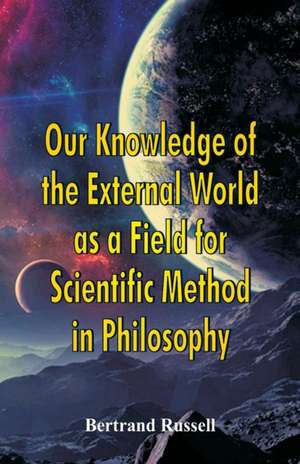Our Knowledge of the External World as a Field for Scientific Method in Philosophy
Autor Bertrand Russellen Limba Engleză Paperback – 30 dec 2017
| Toate formatele și edițiile | Preț | Express |
|---|---|---|
| Paperback (2) | 47.86 lei 3-5 săpt. | |
| CREATESPACE – | 47.86 lei 3-5 săpt. | |
| Alpha Editions – 30 dec 2017 | 95.73 lei 6-8 săpt. |
Preț: 95.73 lei
Nou
Puncte Express: 144
Preț estimativ în valută:
18.32€ • 19.10$ • 15.23£
18.32€ • 19.10$ • 15.23£
Carte tipărită la comandă
Livrare economică 21 martie-04 aprilie
Preluare comenzi: 021 569.72.76
Specificații
ISBN-13: 9789386874252
ISBN-10: 9386874253
Pagini: 208
Dimensiuni: 140 x 216 x 13 mm
Greutate: 0.3 kg
Editura: Alpha Editions
ISBN-10: 9386874253
Pagini: 208
Dimensiuni: 140 x 216 x 13 mm
Greutate: 0.3 kg
Editura: Alpha Editions
Notă biografică
Bertrand Russell, (18 May 1872 - 2 February 1970) was a British philosopher, logician, mathematician, historian, writer, essayist, social critic, political activist, and Nobel laureate. At various points in his life, Russell considered himself a liberal, a socialist and a pacifist, although he also confessed that his sceptical nature had led him to feel that he had "never been any of these things, in any profound sense. Russell was born in Monmouthshire into one of the most prominent aristocratic families in the United Kingdom In the early 20th century, Russell led the British "revolt against idealism" He is considered one of the founders of analytic philosophy along with his predecessor Gottlob Frege, colleague G. E. Moore and protégé Ludwig Wittgenstein. He is widely held to be one of the 20th century's premier logicians.[67] With A. N. Whitehead he wrote Principia Mathematica, an attempt to create a logical basis for mathematics, the quintessential work of classical logic. His philosophical essay "On Denoting" has been considered a "paradigm of philosophy".[71] His work has had a considerable influence on mathematics, logic, set theory, linguistics, artificial intelligence, cognitive science, computer science (see type theory and type system) and philosophy, especially the philosophy of language, epistemology and metaphysics. Russell was a prominent anti-war activist and he championed anti-imperialism. Occasionally, he advocated preventive nuclear war, before the opportunity provided by the atomic monopoly had passed and he decided he would "welcome with enthusiasm" world government.[74] He went to prison for his pacifism during World War I. Later, Russell concluded that war against Adolf Hitler's Nazi Germany was a necessary "lesser of two evils" and criticised Stalinist totalitarianism, attacked the involvement of the United States in the Vietnam War and was an outspoken proponent of nuclear disarmament. In 1950, Russell was awarded the Nobel Prize in Literature "in recognition of his varied and significant writings in which he champions humanitarian ideals and freedom of thought"
